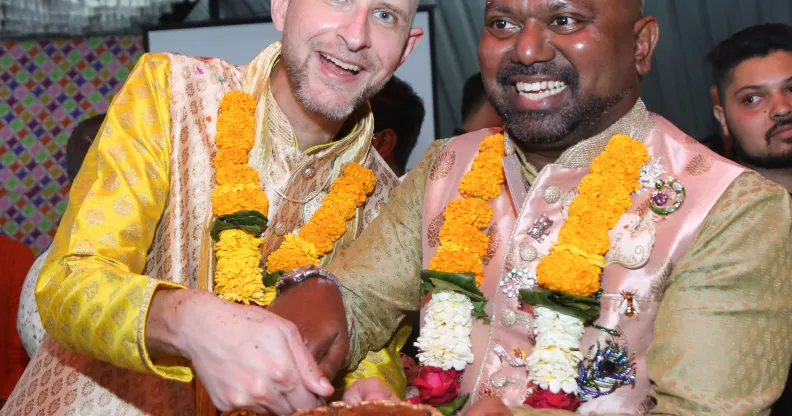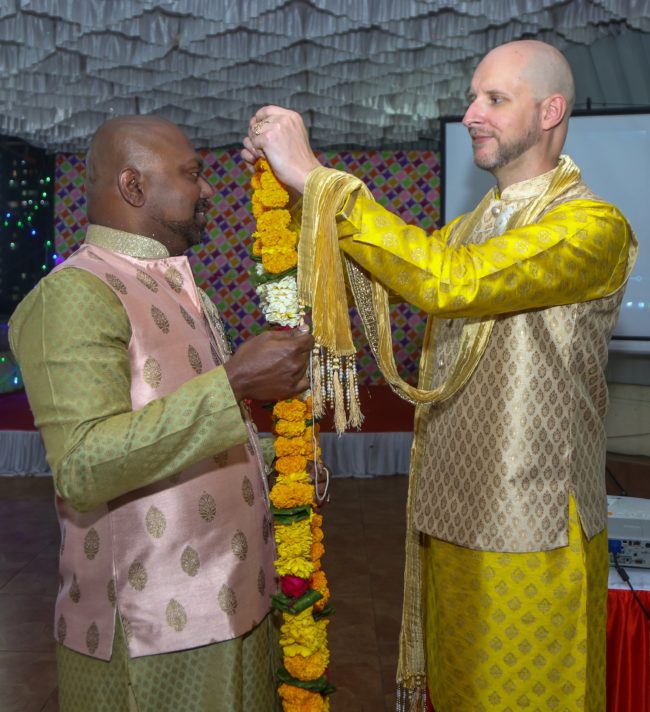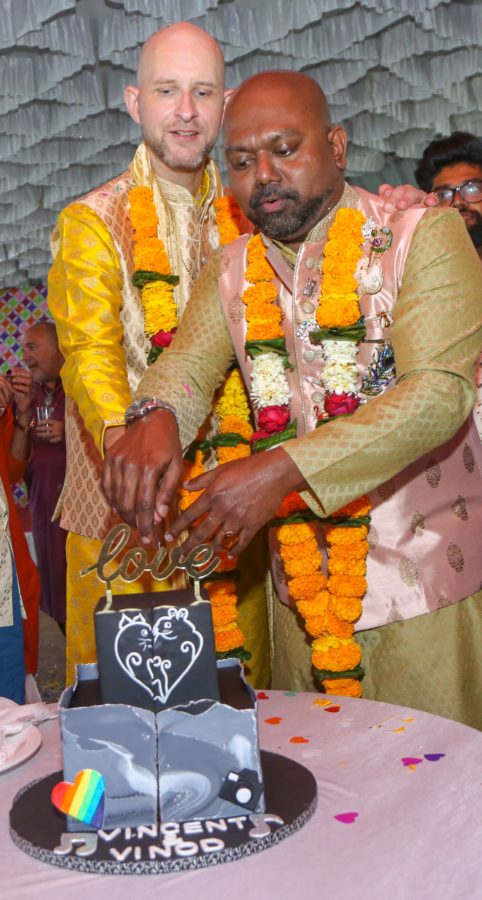Gay couple holds the first same-sex wedding party in Mumbai

Vinodh Philip and Vincent Illaire celebrated the first wedding party in Mumbai since Section 377 was overturned (Vinodh Philip)
A gay couple has held the first wedding party in Mumbai after India’s Supreme Court decriminalised gay sex in September.
Vinodh Philip, 43, and Vincent Illaire, 47, celebrated their marriage with friends and family at a hotel reception on February 1, after tying the knot in Illaire’s homeland of France in December.
Philip, who founded India’s first LGBT+ choir, Rainbow Voices Mumbai (RVM), told PinkNews that he wanted to organise the party because “Mumbai was the city where I came out as a gay man.

The couple held a party in Mumbai with their friends and family (Vinodh Philip)
“Mumbai was the city that helped me come out of my closet and start RVM. Mumbai made me the confident and bold gay Indian man that I am now,” he added.
“And loads of our friends are in Mumbai, so it was the most natural of choices for us.”
Mumbai wedding party welcomed by friends and family
The activist, who came out to his parents when he was 38—after creating the choir—said he and his husband had planned for a subdued event, but his loved ones had other ideas.
“It was just not like what we had planned it to be, to be honest,” said Philip. “We were not trying to copy heterosexual marriages as we wanted to do our own thing.
“All we wanted was a quiet little buffet with a bar for drinks on a rooftop where we could meet friends, take pictures and have some quality time chatting and catching up. We’d like to think we are quite down to earth without wanting anything flashy.
“But all this went for a toss when our friends and family did a lot of networking amongst themselves in the background to make it into a grand affair.”
He said there was “a little performance by RVM, a wedding cake, the exchange of garlands and also the wearing of a mangalsutra (a necklace which the groom places on their spouse) and toe rings as symbols of marriage, according to the Indian tradition.
“They really had a very different wedding reception party in mind for us, from us!”
Local businesses also supported the Mumbai same-sex wedding party
The married couple, who met on Grindr and started dating in July 2016, initially decided not to tell staff at the Anantha Executive Suites about the reason for their reception.
They even asked staff to simply write: “Vinodh and Vincent welcome you” on the sign directing guests to the roof—but when Philip had a change of heart and revealed the party’s true nature, he was delighted by the positive response.
“The manager of the hotel told us that he was very happy to have his space be used for this purpose,” Philip said.

The gay spouses cut their wedding party cake (Vinodh Philip)
“He said that they were very happy and would be open to have many more such parties for LGBTQ folk. This response was truly touching.”
A local dessert shop, Giggles, supplied the wedding cakes, even throwing in a sugar-free cake for Vinodh, who is diabetic.
“They were very supportive,” he said. “They have always been huge supporters of the LGBTQ community.”
Gay couple’s Mumbai reception celebrates decriminalisation of gay sex
Philip and Illaire’s wedding party followed the symbolic union of two lesbians from the northern town of Hamirpur in December.
And Philip said that the Supreme Court’s unanimous overturning of Section 377, a 147-year-old law from the colonial era, meant “a lot” to him and other same-sex couples in India.
“We like to see it as decriminalising gay love, as love is all we are striving for and living for—and it’s worth the strife!”
— Rainbow Voices Mumbai founder Vinodh Philip
“It means that first of all, I am not considered a criminal in the country of my birth where I am a law-abiding citizen and taxpayer,” he explained. “I feel less afraid and am bolder.
“I also feel that our efforts to bring about this freedom for our community has not gone in vain. We like to see it as decriminalising gay love, as love is all we are striving for and living for—and it’s worth the strife!
“It’s heartening that the verdict has made us equal to all other citizens under the law.”
Same-sex marriage is still not legal in India.
Vinodh Philip says the future is bright for LGBT+ Indians
He said there was an opportunity for queer people to make rapid progress towards equality after Section 377.
“In India, as probably in some other countries too, the law has to come into force to bring about social change,” said Philip.
“India is a country where the dowry system, sati (the burning of a wife with her dead husband), untouchability (the refusal to touch people of certain castes) and child marriage had to be criminalised by the law to make way for social change and acceptance.
“The impact may not seem great now (as yet), but in the long run, it will make create a more equal and less prejudiced society”
— Rainbow Voices Mumbai founder Vinodh Philip
“In the same way, for social change—which is slowly happening in urban areas more than in rural—it was important to decriminalise gay love by throwing 377 out the door,” he explained.
“The impact may not seem great now (as yet), but in the long run, it will make create a more equal and less prejudiced society.
“Also, it makes way for Indian businesses who did not want to openly support and hire LGBTQ employees to do so now, for landlords to lease houses to gay couples, and so on and so forth.”

